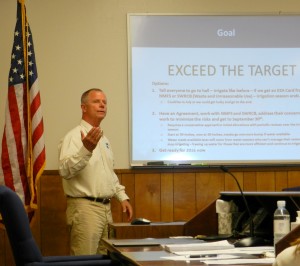
Among the most sacred shibboleths of the water world’s power elite, none is more revered than the one that proclaims, “Water sales are wise and beneficial.” Of course, no member in good standing of water’s movers and shakers would ever refer to “water sales,” a vulgar and much too accurate description. The proper terminology is “water transfers.” As is often the case with euphemisms, the purpose is to conceal an unpleasant reality.
The implication of “water transfers” is that money has little or nothing to do with moving water from one place to another. Rather, the motivation is supposed to derive from the “wise and beneficial use” doctrine that undergirds much resource management policy.
In fact, money has always been the prime mover of water sales. Thanks to the enduring success of Roman Polanski’s Chinatown, millions of people have a least a general understanding of the money and machinations behind moving water. Unfortunately, too few realize that the Owens Valley story is only one of many such cases.
Like road building, water sales escalate the problems they are intended to address. Both road building and water sales are growth inducing: The more roads and water sales, the greater the demand for roads and water.
Water sales have an added liability. Especially over a span of wet years, water sales have a mirage-like effect―they encourage buyers and sellers to believe there will always be “excess water” available.
In fact, the entire notion of excess water has always been based on a misunderstanding of water’s role in the ecosystem. One of the best examples is the ongoing devastation of the San Joaquin Delta.
In theory, the mighty Sacramento, California’s largest river, has had excess water enough to help southern California and the San Joaquin Valley continue decades of growth, both in population and permanent crops like almonds and pistachios. In fact, diversions from the Sacramento River have been a major factor in the deterioration of the Delta ecosystem and the decline of fisheries dependent on it.
Probably the most difficult thing to remember about water sales is that they’ve most often occurred within a default context of environmental destruction. California lost over 90% of its wetlands well before the Delta became so critically endangered. Those same wetlands were critical features in flood control and groundwater recharge, both of which have yet to be properly managed by our sales-driven water policy managers.
Nonetheless, loss of wetlands and the ongoing degradation of the San Joaquin Delta, devastation of salmon runs and fisheries, and a growing roster of endangered species haven’t convinced proponents of water sales that the “surplus water” notion is a harmful mirage. Even after a year in which it pumped a record amount of groundwater, the supposedly water-rich Oakdale Irrigation District (OID) had planned a water sale for this year. Only the threat of a lawsuit from a local farmer prevented the sale.
Shortly after the sale was aborted, the OID faced a rebellious uprising from senior water users when it informed them their allotments would be cut. There could be no clearer case that the belief in surplus water was ill-founded, but facts aren’t the issue when it comes to the ideology of water sales: Money is.

This is one of the most insightful articles on California Water ever composed. Thank you Mr. Caine! Jim Brobeck, Water Policy Analyst, AquAlliance.net
Thank you Mr. Brobeck. We appreciate your remarks and also the good work of AquAlliance.